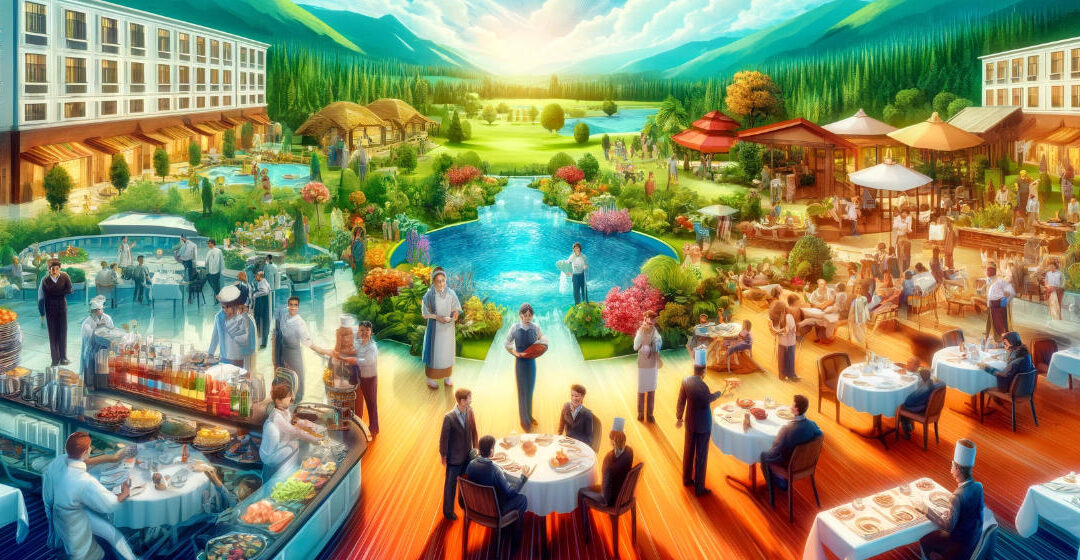Each of these industries involve serving the public and working with rapidly moving inventory, so it makes sense that work experience in retail might make a person wonder about moving into hospitality.
In today’s post, we’ll examine this potential move in terms of the following:
- How readily skills from retail transfer to hospitality
- Career advancement opportunities in each field
- Comparing the effects the pandemic had on each field and whether there’s a meaningful difference in stability for each now.
Retail to Hospitality and Skill Transferability
While certain aspects of working at a store like Best Buy are obviously not 1:1 with working in a hotel, there’s a good degree of carryover from one to the other. For instance:
- Both settings involve training in checking out customers, answering questions creatively, and continuously straightening up areas the customers frequent.
- Not always, but in each industry there are commission opportunities for upselling customers. It could be warranty plans, store credit, premium hotel memberships, or adding dessert options to a meal at a restaurant. These sales skills transfer well, and being savvy in retail sales is a leg up when transferring to hotels and tourism.
- Relatedly, presentation and promotional skills are valuable in each field, whether it’s showcasing a hot new product or a new event space/amenity.
- Quick problem solving. Whether a customer has an unusual question, an urgent problem, or a misunderstanding about products, being able to think on your feet and solve challenges goes a long way toward a smooth operation.
- Handling pressure and complaints. These aren’t situations people boast about, but they happen. A person’s ability to stay cool and professional under tight timelines, frustrated customers, or unique challenges that weren’t in the training are hallmarks of career advancement in either field. A big enough bad scenario where one handles it poorly with a customer can require management to step in and damage the business’ credibility with that customer. On the other hand, management is always hungry for individuals who can handle these tough moments with composure.
Career Advancement and Post-Pandemic Opportunities
BLS.gov estimates that by 2031 there will be over 8 million new jobs as the U.S. recovers from the pandemic. Roughly 21% of those new jobs will be in the hospitality industry. (Source)
During the COVID-19 pandemic, the leisure and hospitality industry was heavily impacted, experiencing a significant decline in employment due to the need for social distancing and the temporary shutdown of businesses.
By 2021, only about a quarter of the jobs lost during the pandemic had been recovered in this sector. Over the decade from 2021 to 2031, the industry is expected to see rapid employment growth, largely as a recovery from the low point in 2021.
Specifically, industries like event promotion, amusement parks, and performing arts are forecasted to grow quickly, driven by an increasing public interest in recreational activities.
The food services and drinking places sector, in particular, is projected to lead in job creation, expected to add approximately 1.3 million jobs by 2031. This reflects a strong rebound as these businesses aim to fill positions lost during the pandemic. For instance, the occupation of restaurant cooks is anticipated to see one of the largest growths — adding nearly 460,000 new jobs.
This represents a much faster growth rate compared to the overall employment growth expected in the economy, and also highlights the opportunities within the leisure and hospitality sector as it recovers and expands post-pandemic.
Retail Has Transitioned Even Further To Online Experiences
It’s important to note that while at a glance it appears the retail industrial has rebounded faster than hospitality, a lot of the reason it has been able to do that is transitioning to online shopping harder than ever before.
Obviously that’s not as possible with hospitality. Sure, you can book hotel stays and event centers online, but the physical event space still needs to be present. And for restaurants, someone still needs to cook the food at an actual location.
Also, in some cases the retail shift to favoring online shopping can mean less local jobs.
For any area that happens to have a big Amazon facility, for one example, perhaps it means a lot of local jobs. But in many other cases, it may also mean local retail stores have closed down in favor of e-commerce, leaving those locals without a physical store for work.
In this way, the hospitality industry may be a safer bet career-wise. It’s showing growth and rebound since the pandemic, and the growth is not from a purely online experience like retail often is.
However, There’s The Consumer Preference for Experiences Over “Things” To Consider.
These days there’s an increased preference for experiences over buying things. An Eventbrite survey and found that 78% of Gen Y participants reported that they’d rather spend money on memorable experiences than material things. (Winspire)
This preference is driving growth in sectors directly related to hospitality, such as travel services and restaurants, rather than traditional retail spaces.
In 2023 Disney theme parks saw record earnings, corresponding to a marked increase in all travel — within the U.S. and international.
The Bureau of Economic Analysis charted data showing, in a similar narrative, that people throughout the U.S. are spending more on eating out now than years back. (BEA)

